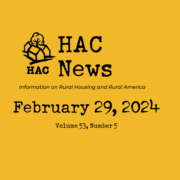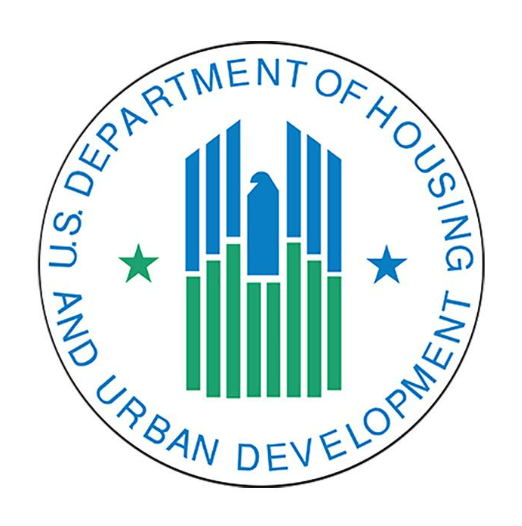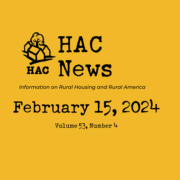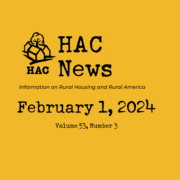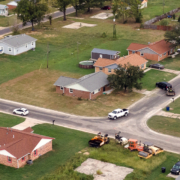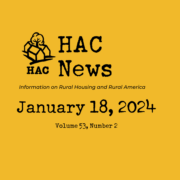Some HUD Programs Cut in Final FY24 Spending Bill, But Vouchers Fully Funded
Some Department of Housing and Urban Development programs will receive increased funding in FY24 under the final minibus appropriations bill released by congressional leaders on March 3. The bill is expected to pass before funding for several agencies, including HUD, runs out on March 8. Fiscal year 2024 began on October 1, 2023.
— HAC’s analysis of FY24 appropriations for USDA housing programs is available here. —
The bill raises funding levels for HUD’s tenant-based and project-based voucher programs, providing enough to renew all expiring vouchers and fund additional vouchers. The Center on Budget and Policy Priorities had estimated the House and Senate bills’ figures for tenant-based Housing Choice Vouchers would end that support for 80,000-112,000 families. Instead, according to the National Low Income Housing Coalition, the final bill will enable HUD to renew those vouchers and add 3,000 more.
Native American housing receives an increase from $1.02 million in FY23 to $1.344 million this year. Homeless assistance funding is higher as well. A few programs, like Community Development Block Grants and fair housing, receive the same funding as in FY23. Others, including HOME, SHOP, Sections 202 and 811, and healthy homes, will have lower funding this year than last. The new PRICE manufactured housing preservation program drops from $225 million in FY23 to $10 million in FY24, but it had seemed likely to get no funding at all.
This agreement on funding for FY24 – which started on October 1, 2023 – comes just one week before the President’s budget for FY25 will be released, kicking off the process of determining funding for next year.
| HUD Program (dollars in millions) | FY23 Final Approp. | FY24 Admin. Budget | FY24 House Bill H.R. 4820 |
FY24 Senate Bill H.R. 4366 |
FY24 Final |
| CDBG | $3,300* | $3,300 | $3,300 | $3,300 | $3,300 |
| HOME | 1,500 | 1,800 | 500 | 1,500 | 1,250 |
| PRICE Manuf. Hsg. Preserv. | 225 | 0 | 20 | 0 | 10 |
| Self-Help Homeownshp. (SHOP) | 13.5 | 10 | 10 | 13.5 | 12 |
| Veterans Home Rehab | 1 | 4 | 1 | 0 | 0 |
| Rural Cap’y Bldg (RCB) | 6 | 5 | 7 | 6 | 6 |
| Tenant-Based Rental Asstnce. | 27,600 | 32,703 | 31,132 | 31,738 | 32,387 |
| VASH setaside | 50 | 0 | ** | 30 | 15 |
| Tribal VASH | 7.5 | 5 | 5 | 7.5 | 7.5 |
| Replacemts. for 521 RA | – | 20*** | – | – | – |
| Project-Based Rental Asstnce. | 13,938 | 15,904 | 15,820 | 15,790 | 15,610 |
| Public Hsg. Capital Fund | 3,200 | 3,225 | 3,235 | 3,200 | 3,410 |
| Public Hsg. Operating Fund | 5,109 | 5,133 | 5,128 | 5,530 | 5,501 |
| Choice Neighbrhd. Initiative | 350 | 185 | 0 | 150 | 75 |
| Native Amer. Hsg. | 1,020 | 1,053 | 1,344 | 1,082 | 1,344 |
| Homeless Assistance Grants | 3,633 | 3,749 | 3,729 | 3,908 | 4,051 |
| Hsg. Opps. for Persons w/ AIDS | 499 | 505 | 505 | 505 | 505 |
| 202 Hsg. for Elderly | 1,075 | 1,023 | 913 | 1,075 | 913 |
| 811 Hsg. for Disabled | 360 | 356 | 208 | 360 | 208 |
| Fair Housing | 86 | 90 | 85 | 86 | 86.4 |
| Healthy Homes & Lead Haz. Cntl. | 410 | 410 | 345 | 350 | 345 |
| Housing Counseling | 57.5 | 66 | 57.5 | 57.5 | 57.5 |
* This table does not show amounts for Community Projects/Congressionally Directed Spending (popularly known as “earmarks”), which were included in the CDBG account beginning in FY22.
** The bill does not specify an amount for HUD-VASH vouchers but the National Low Income Housing Coalition reports that the broader Tenant-Based Rental Assistance funding in the bill will cover those renewals.
*** This $20 million request is explained in HAC’s summary of the USDA rural housing budget proposal.
Senate Minibus Includes HUD and USDA
On November 1, 2024, the Senate passed a “minibus,“ H.R. 4366, that includes funding for USDA, Transportation-HUD, and Military Construction-VA.
Senate Funding Bill Supports Most HUD Programs
On July 21, 2023, the Senate Appropriations Committee unanimously approved a bill to fund HUD for fiscal year 2024. Like the House bill, the Senate’s version maintains aid for tenants. It holds many other programs at their FY23 funding levels, rejecting the House’s proposed cuts to HOME, Section 202 elderly housing, Section 811 housing for people with disabilities, and the Self-Help Homeownership Opportunity Program (SHOP). It includes no funding, however, for the new Preservation and Reinvestment Initiative for Community Enhancement (PRICE) program for preservation of manufactured housing.
House FY24 Funding Bill Supports Tenants, Cuts HOME
The House Transportation-HUD Appropriations Subcommittee approved an FY24 spending bill on July 12 that would maintain funding for tenant vouchers, public housing, and Native American housing programs but would cut programs including HOME, Section 202 elderly housing, Section 811 housing for people with disabilities, and the Self-Help Homeownership Opportunity Program (SHOP).
HOME would be most drastically impacted, with its funding cut by two-thirds, from $1.5 billion in FY23 to $500 million in FY24. SHOP would fall back to the $10 million funding level it had for several years before being increased to $13.5 million in FY23. The Choice Neighborhoods Program would be eliminated and the new Preservation and Reinvestment Initiative for Community Enhancement (PRICE) program for preservation of manufactured housing would be cut from $225 million in FY23 to $20 million in FY24.
The bill would rescind $564 million appropriated in past years for the Lead Hazard Control and Healthy Homes programs but not yet spent.
The bill also proposes to block HUD’s February 9, 2023, Affirmatively Furthering Fair Housing (AFFH) proposed regulations and HUD’s ability to require specific changes to existing zoning laws under its June 10, 2021 AFFH interim final rule.
The Senate has not yet released its FY24 Transportation-HUD appropriations bill, but its version is likely to be substantially different from the House’s proposal.
HUD Budget Proposes to Shrink Small Programs, Expand Support for Others
March 13, 2023 — The administration’s budget for fiscal year 2024 requests funding increases in many HUD programs and calls for legislation expanding support to far more tenants and homebuyers. At the same time, however, the budget would cut some of HUD’s smallest programs, including two that are particularly important for rural residents: the Self-Help Homeownership Opportunity Program (SHOP) and the Rural Capacity Building (RCB) program. Details are provided in the table below.
HAC presented a webinar on “Rural Housing in the Fiscal Year 2024 White House Budget” on Wednesday, March 15. Watch the recording and view the slides here.
Two Steps Back for Rural Places and Native Americans
SHOP and RCB both saw small increases from FY22 to FY23, but the administration’s budget would roll those back for FY24. SHOP grew from $12.5 million in FY22 to $13.5 million in FY23 and would get only $10 million under the budget request. RCB received $6 million for the current year, but the budget would reduce it to its FY23 level of $5 million.
The administration requests no funding for manufactured housing grants through the Preservation and Reinvestment Initiative for Community Enhancement (PRICE), which was created in the FY23 omnibus appropriations bill.
The pool of funding that covers most of HUD’s Native American housing efforts would be increased from $1.02 billion in FY23 to $1.053 billion. But the much smaller Section 184 loan guarantee program, which has $5.5 million in FY23, would be cut to less than one-fifth of that, $905,700. At the same time, the budget asks Congress to expand Section 184, making it available to all Tribal members regardless of where they purchase a home.
Support for Renters
The budget proposes to create new, substantial assistance for tenants through mandatory spending proposals. These efforts, which would not be funded through the annual appropriations process, would need to be approved separately by Congress. That is extremely unlikely to happen in the current political climate.
Proposed mandatory spending would include:
- $9 billion to provide vouchers for all youth aging out of foster care annually;
- $13 billion for the estimated 450,000 extremely low-income veteran families
- $7.5 billion for new Project-Based Rental Assistance contracts for extremely low-income households;
- $7.5 billion to modernize public housing; and
- $3 billion for competitive grants to states and localities for eviction reduction efforts such as emergency rental assistance and access to legal counsel.
The budget also proposes to extend assistance to tenants through some existing programs:
- $565 million for new incremental vouchers for 50,000 additional households, specifically including those who are experiencing or at risk of homelessness or fleeing or attempting to flee domestic violence or similar violence; and
- $300 million for capital investments in public housing.
The budget proposals for the Treasury Department would expand the Low Income Housing Tax Credit, as well as the New Markets Tax Credit.
Homeowner Aid and Removing Barriers
The administration’s budget calls for $10 billion in mandatory funding for a new First-Generation Down Payment Assistance program to help address racial and ethnic homeownership and wealth gaps. Homeowner assistance would also be supported by $100 million to states and territories through the existing HOME program. HOME’s funding would increase from $1.5 billion in FY23 to $1.8 billion in FY24.
The Community Development Block Grant program would again receive $3.3 billion, including $85 million to continue the “Yes In My Back Yard” or YIMBY program created in FY23 for removing regulatory barriers to housing production and preservation.
| HUD Program(dollars in millions) | FY22 Final Approp. | FY23 Final Approp. | FY24 Admin. Budget |
| CDBG | $3,300* | $3,300* | $3,300 |
| HOME | 1,500 | 1,500 | 1,800 |
| Self-Help Homeownshp. (SHOP) | 12.5 | 13.5 | 10 |
| Veterans Home Rehab | 4 | 1 | 4 |
| Tenant-Based Rental Asstnce. | 27,370 | 27,600 | 32,703 |
| VASH setaside | 50 | 50 | 0 |
| Tribal VASH | 5 | 7.5 | 5 |
| Replacemts. for 521 RA | – | – | 20** |
| Project-Based Rental Asstnce. | 13,940 | 13,938 | 15,904 |
| Public Hsg. Capital Fund | 3,388 | 3,200 | 3,225 |
| Public Hsg. Operating Fund | 5,064 | 5,109 | 5,133 |
| Choice Neighbrhd. Initiative | 350 | 350 | 185 |
| Native Amer. Hsg. | 1,002 | 1,020 | 1,053 |
| Homeless Assistance Grants | 3,213 | 3,633 | 3,749 |
| Hsg. Opps. for Persons w/ AIDS | 450 | 499 | 505 |
| 202 Hsg. for Elderly | 1,033 | 1,075 | 1,023 |
| 811 Hsg. for Disabled | 352 | 360 | 356 |
| Fair Housing | 85 | 86 | 90 |
| Healthy Homes & Lead Haz. Cntl. | 415 | 410 | 410 |
| Housing Counseling | 57.5 | 57.5 | 66 |
| Rural Capacity Bldg | 5 | 6 | 5 |
* Substantial increases in CDBG funding for FY22 and FY23 was driven nearly entirely by the return, after a 10-year absence, of $1.5 billion for the Economic Development Initiative for the purpose of funding Community Projects/Congressionally Directed Spending (popularly known as “earmarks”). In FY23, just under $3 billion is added for earmarks. These figures are not included in the table.
** This $20 million request is explained in HAC’s summary of the USDA rural housing budget proposal.


